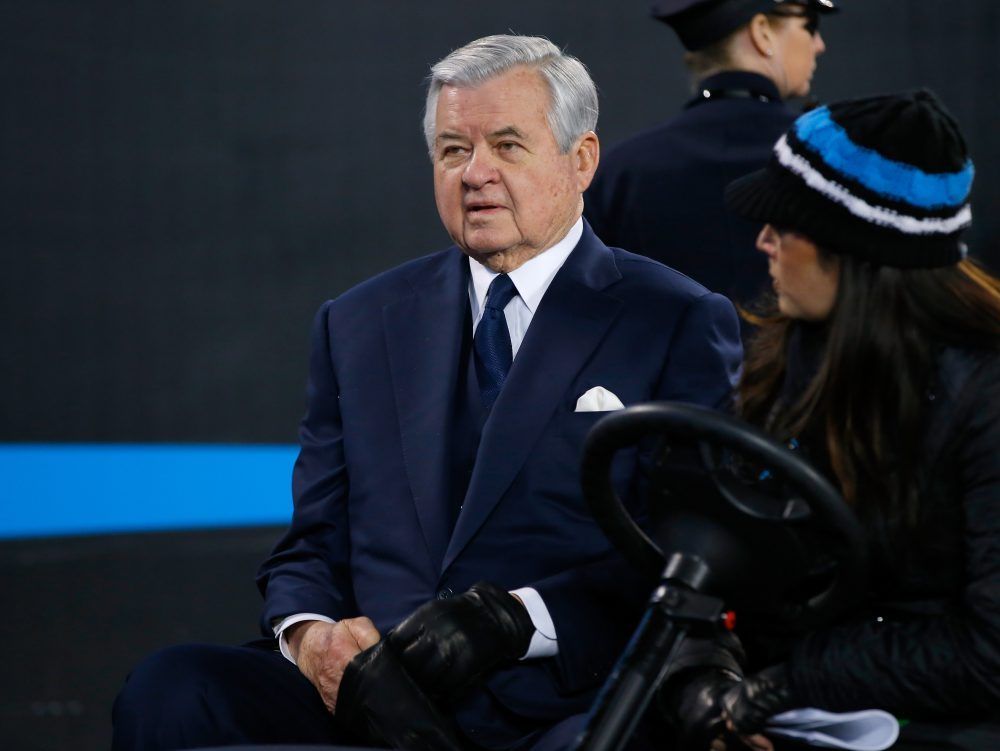Jerry Richardson learns his punishment for claims he sexually harassed women: Raking in billions of dollars

Jerry Richardson, the owner of an NFL team, is crashing and burning amid sexual harassment allegations, including claims that he belittled women for years in various humiliating ways. But you know what? He has found an escape that looks more like a gentle ride under a golden parachute.
Richardson, the 81-year-old owner of the Carolina Panthers who has been accused of harassing female employees and racial discrimination, said he will sell the team after this season, distancing himself from the league and those women he reportedly groped and violated. As part of his penance, he will probably rake in billions of dollars.
That’ll teach him.
The Panthers are estimated to be worth at least US$2.3 billion, and Richardson, in a display of crooked justice, is set to collect that windfall.
Here’s what would make more sense: for Richardson to announce that the proceeds of the sale — or even just a couple hundred million? — would be donated to the women he harassed.
Harvey Weinstein, Russell Simmons, Charlie Rose, Matt Lauer, Mario Batali — the list goes on and on. All have been chased from the top of their professions for disgusting behaviour involving women they worked with. They are suddenly pariahs, their reputations destroyed. But they remain very rich men, and their families, for generations, will be able to live off the financial rewards they collected while perpetuating these offences.
What about their victims, some of whom were their employees? They might get payouts from legal settlements, but certainly not enough to fairly compensate them for years of abuse, mental anguish and missed career opportunities.
Richardson, who made his fortune in the fast-food industry, might be the richest of all the men accused in the #MeToo movement so far. Perhaps it’s appropriate, in a legal sense, that he is able to sell his company and walk off the stage. But it doesn’t seem morally fair that he should benefit so richly from it.
His career shows how abusing women hardly prevents some men from becoming fabulously wealthy and celebrated businessmen in male-dominated domains like Hollywood, restaurants and sports. Now he has been called out, as reported by Sports Illustrated, and he’ll collect his chips and walk away. (He has not publicly confirmed or denied the accusations.)
The Panthers have referred to Richardson’s situation as one of “workplace misconduct.” Not sexual harassment or sexual assault — workplace misconduct. Was he stealing office supplies, or leaving work early every day, or watching Cleveland Browns games in the office?
According to the Sports Illustrated article, which quoted anonymous sources, the accusations against Richardson included his grazing women’s breasts as he buckled their car seat belts; asking women if he could personally shave their legs; and, on Fridays, the Panthers’ weekly wear-jeans-to-work days, asking women to spin around so he could check out their backsides.
Knowing that, it’s difficult not to take offence at the “workplace misconduct” euphemism. When a professional sports team, with the league’s backing, is calling such reprehensible behaviour “workplace misconduct,” it’s no surprise that Richardson was able to thrive for so many years in his profession.
This is the NFL, the ultimate men’s club. Though it took longer than I expected, the league is feeling the heat of the #MeToo movement. Several NFL Network employees were cited last week in claims of sexual harassment and abuse by a former wardrobe stylist for the network. Now the NFL is investigating the Richardson case.
What do Richardson’s esteemed contemporaries make of all this? Here’s Jerry Jones, owner of the Dallas Cowboys:
“Jerry is one of the really, really, really outstanding men of football that I’ve ever met, and I really admire him,” Jones said on Sunday.
He went on to add that Richardson is “a big man with a big heart. But I’m really sad. I want all of those kind of men that we can have in the National Football League.”
Just how many more of “those kind of men” are in the National Football League?


